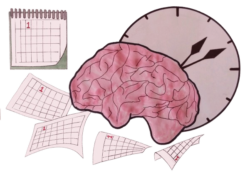Time seems to escape us all. Though age-old mechanisms such as the calendar and clock help us organize it in our three-dimensional reality, our internalized experience of its passage can vary wildly. Why is it that time can slow down to a sluggish pace but also fly by, especially when we’re having fun? These questions have guided scientists in time perception studies.
Unlike our other senses, no one organ is dedicated to the sole task of perceiving time. Rather, scientists have identified that multiple areas of the brain work together to execute and regulate time perception. The cerebral cortex, cerebellum, hippocampus and basal ganglia — all of which perform other functions as well — have been found to activate in studies involving temporal discrimination tasks. While the question of where in the brain is generally accepted, the question of how time perception occurs on a neuronal level is not understood.
However, in recent years, many empirical studies that have explored the broad process of time perception have found that it is intrinsically linked to subjective sensations. Physiological changes, such as increases in levels of anxiety or chronic pain, facilitate bodily time measurement. The underlying explanatory theory is that bodily changes bring attention to the fact that the present self feels different than it did in preceding moments. The awareness that a state change has occurred, brought about by visceral signals in the insular cortex — a lobe of the cerebral cortex dedicated to multimodal sensory processing and other homeostasis-regulatory functions — propagates the understanding that time passage has occurred. Memory, then, is crucial to the perception of time, as it marks how different bodily states correspond to moments along time’s continuous trajectory from past to present and into the future.
Like physiological sensations, emotions are linked to time perception and have been found to affect the degree of perception of time and aid in memory storage, helping to explain why the sensation of time can vary based on mood. When it comes to temporal perception as a function of memory storage, stronger emotions produce high arousal levels, leading us to greater bodily awareness and a degree of attention placed on the experience. The experience is therefore highlighted in time, causing it to be stored “higher” in the working memory roster.

KATYA KISELEVA / DAILY NEXUS
Regarding the perception of time passage varying with mood state, scientists have investigated the process in task completion experiments that linked proneness to boredom to the perception of time passage. Attendance to the task at hand was crucial, as it was found that individuals struggling with tasks took longer to complete them, with the realization that it took longer than expected to complete causing them to feel bored. In these studies, individuals experiencing high levels of boredom with the task at hand were found to be worse at estimating time, while individuals with low levels of boredom tended to underestimate the passage of time. If you are engaged well with a task, your high attention and lack of boredom means you are not constantly engaged with visceral discomfort. So, when you’re enjoying yourself and having fun, time feels as though it’s “flying” because attention is shed on the task, not on the self.
















I actually have even produced $32800 best in thirty days simply running some clean responsibilities from a laptop. Immediately as soon as I’ve misplaced my preceding position, I became very distressed and luckily I actually have observed this pleasant on line possibility that’s why I should vs04 make heaps staying at home. Everyone can virtually be part of this pleasant work & accumulate greater bucks online with the aid of using.
.
.
Detail Here…………………………………………………….. https://smartearn72.blogspot.com/